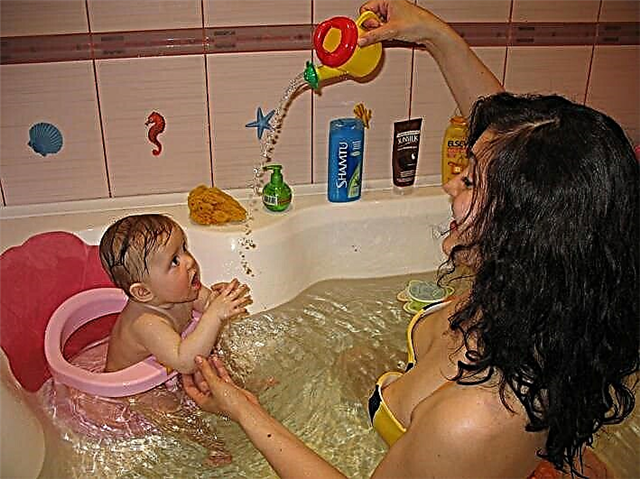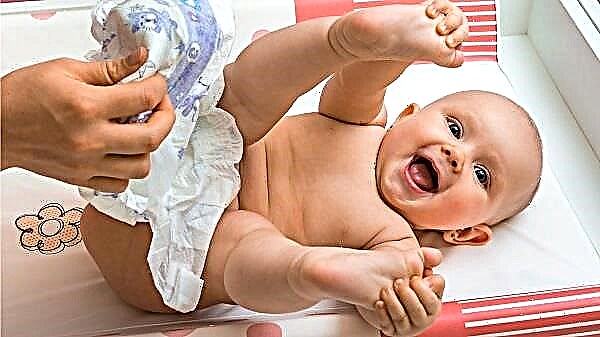All women who have given birth to their first child are not yet very experienced with babies. And then there was endless crying, colic in the tummy, as well as other symptoms that seem "scary" to the young mother. So not long and confused, and the very hysterics. What should be done in this case? Call an ambulance, call your mom, and drink valerian? It's not nearly as scary as your imagination suggests. The main thing is to keep yourself calm in any situation. Let's take a closer look at the “terrible” symptoms.

Symptom No. 1. Temperature 37.2
Having hugged the baby to you, did you feel that he has a hot forehead? The thermometer readings stopped at around 37.1 - 37.5. There is only one thought in my head: is the baby really sick? What does a frightened mother do in this case? Of course, he is taking urgent action. Help from relatives - yes, forums on the Internet - yes, urgent, very urgent doctor's call - yes!
A temperature of a little over 37 is normal in newborns. You just need to watch the baby. If he is active, his appetite, stool, and urination are not disturbed, then there are no prerequisites for emergency measures. Young mothers should know that thermoregulation is not yet fully formed in newborns. Because of this, babies are often freezing, which is manifested by hiccups, cold feet and hands. If you measure the temperature, then it is quite often "elevated", but at the moment it is physiologically normal. But the usual 36.6 will be established only closer to the year of the baby's life.
Naturally, if a child's behavior changes, he refuses to eat, any other alarming symptoms appear, then the doctor should be called immediately.
- Temperature 37 in babies
- What is the normal body temperature for a baby
Symptom number 2. Rash on the face and body
Only a week has passed - another after the birth, and the baby has a rash on the face and head. Cause? Mom blames herself for everything, probably ate something extra, which is not suitable for crumbs. The solution is to urgently remove everything that is dubious and harmful from the diet. As a result, my mother switches to a meager diet of buckwheat, chicken breast and kefir. However, this does not help either. So the baby is allergic? And the process of treatment begins in the form of creams, ointments for allergies and drugs for dysbiosis.
Stop!
The reason lies in neonatal pustulosis. This is an unpleasant but natural process that one third of all newborns face. And the thing is that a woman during pregnancy passes her own hormones to the future baby. By the way, this transmission process does not end during breastfeeding. This condition of the baby does not require absolutely any drug treatment, since after 1.5 - 3 months the child's skin will cleanse itself. And you don't need to panic, just practice your hygiene even more thoroughly. The baby must be washed in the mornings and evenings, and also use chamomile infusion to wipe the face.
Symptom number 3. The appearance of a cold
You should not assume the worst and start taking drastic measures. Calm down! This is most likely a physiological rhinitis. In babies up to 3 months, discharge from the nose of a mucous nature may appear. This is considered an absolutely normal process, since the baby's body adapts to life outside the womb. There is no need to treat such a “runny nose”! To help the baby during the adaptation period, it is necessary to maintain the required humidity in the entire room (especially in the nursery). And also, if necessary, you should clean the nose with an aspirator. However, it must be remembered that a physiological rhinitis can be easily confused with a viral, bacterial or allergic one. But in such a situation, other symptoms will join the runny nose. In any case, it will not hurt to consult a pediatrician who observes the child.
Symptom # 4. The baby flinches during sleep
And what's so special about it? Every person, including newborns, has different dreams. This time. The baby's nervous system is still weak, and for the whole day he accumulates a lot of impressions. These are two. Only those shudders that occur more than 10-15 times per night can cause anxiety in the mother, while the baby wakes up and cries. In this case, a consultation with a neurologist is necessary. If such symptoms are not observed, then mothers should not panic, but it is best to think about milk, which can “burn out” due to unreasonable nervous behavior.
Symptom No. 5. The baby spits up after feeding
Mothers know that almost all newborns vomit after feeding. But when this happens to his own child, questions are poured one after another. Why so often? Why so much? When will it end? Is the mixture not suitable? Is breast milk too fat? Please take it easy! Tell yourself: "Stop!" The reason is the insufficient development of the muscles of the food sphincter, because the baby is just learning to live without the protection of the mother's body. The normal functioning of the sphincter will begin by the year of the baby's life. Another reason for spitting up is the air that the baby swallows during feeding with milk (and this, by the way, is one of the causes of colic). Air forces food out of the stomach. To reduce the manifestations of regurgitation, after feeding, you should hold the baby in your hands in the “column” position for 10 - 15 minutes. In addition, young mothers need to learn how to properly apply the baby to the breast. You can also purchase a special pacifier to prevent air from being swallowed.




